Racial And Economic Justice Are Integral To The Fight For Our Climate
Published Sep 10, 2021
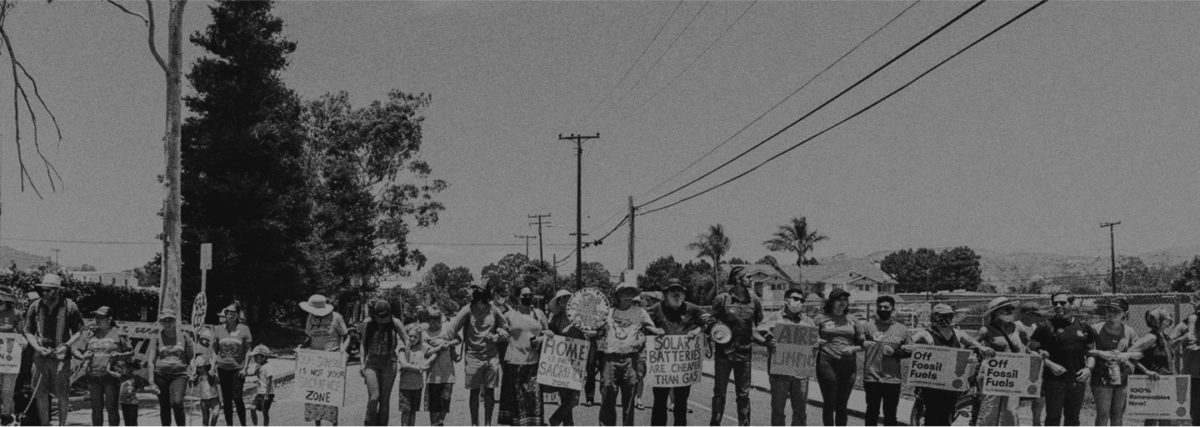
Standing with frontline communities in the fight for environmental justice is critical to protecting water, food, and our climate. Here’s why.
Water shutoffs in economically challenged areas, power plants in communities of color already overburdened by environmental pollution, a proposed factory farm gas plant in a town already blighted by a superfund site. While climate change and environmental pollution impact everyone in the United States, not all of us are impacted the same way or to the same degree. Across the country, lower wealth communities and Black, Indigenous and other communities of color are disproportionately affected by pollution, a lack of access to clean water, and the impacts of climate change.
Food & Water Watch has been fighting against environmental injustices alongside community partners since our inception; the fight continues today.
Environmental Justice Has Been Woven Into The Fabric of Our Early Work
Food & Water Watch’s earliest campaigns were efforts to stop water privatization and strengthen public water infrastructure across the United States and in the global south. We partnered with local groups by bringing national research and organizing resources to defeat water privatization, which disproportionately threatens lower-income communities, in dozens of cities including Milwaukee, Chicago, and Akron. We also worked with water justice movements internationally to move the United Nations to recognize the human right to water.
In subsequent years, we continued to support community-led efforts to protect water and local environments from the threat of factory farms, fracking, pipelines, power plants, and other polluting fossil fuel infrastructure.
We devoted significant resources to these campaigns and in support of our community partners because we believe in the core values of justice for all, economic fairness, and human dignity. But we also understand that to win bold, urgent, and meaningful changes at the federal level to protect our food, water, and climate we must also work to end historic and ongoing discrimination. We must uplift, support, and strengthen a diverse and robust movement for justice.
To that end, we can sometimes provide legal support or research, like the work we did to expose how Flint residents paid the highest water rates in the country at the height of the water crisis there. And exposing the funders behind the Dakota Access Pipeline as the Indigenous community was organizing opposition at Standing Rock is another example of how our strategic, groundbreaking research made a difference.
Our On-The-Ground Work With Coalitions And Partners is at The Heart of Our Mission
Often we are on the ground, working with grassroots environmental justice groups to protect water access and stop dirty energy projects. In doing so, we prioritize building meaningful partnerships and developing smart, strategic campaigns that not only win real improvements in people’s lives but also strengthen our grassroots partners. This approach succeeded in many communities across the country.
The stories below go deeper into the fights we’ve taken on with partners and coalitions all over the country.
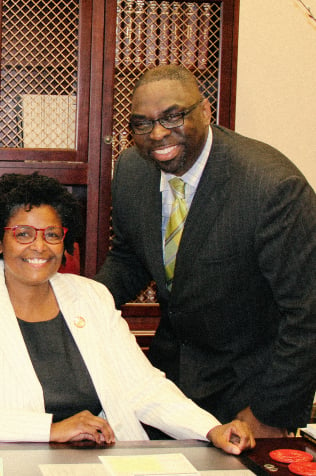
Baltimore, MD: Water Justice In An Affordability Crisis
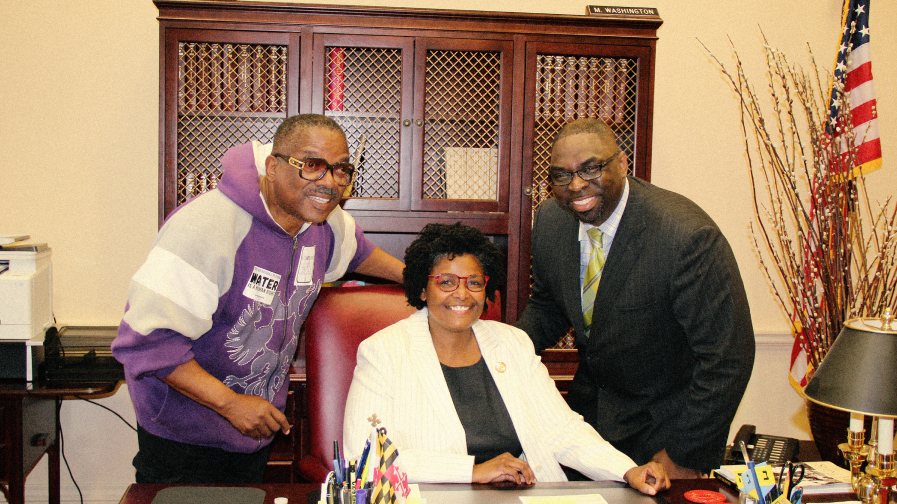
When Pastor Mark James saw a notice on the front door of his church in March 2016 that there was an impending foreclosure, he was shocked. His small congregation, founded by his late mother over 30 years ago, had paid off their mortgage and had made a payment plan with the city for their outstanding water bill. But it was the balance on the water bill combined with an old citation that had forced his church onto the tax sale foreclosure list. A lien on his property was auctioned off by Baltimore City to an out-of-state investor in California.
But Pastor James wasn’t willing to give up his community’s beloved church without a fight. He partnered with State Senator Mary Washington, Food & Water Watch and the Baltimore Right to Water Coalition to not only save his church, but also prevent thousands of families and congregations from facing the threat of tax sale foreclosure over our most basic necessity: water.
Baltimore And The Nation Face A Water Affordability Crisis
According to the United Nations, water is affordable when it is no more than 3% of a family’s income. Nearly half of Baltimoreans are billed more than 3% of their household income for water, with some being billed up to 10%. When families inevitably couldn’t afford to pay these bills, like Pastor James, they faced potentially losing their homes through the tax sale foreclosure – for as little as $750 in unaffordable water bills. Coupled with billing errors that sent many incorrect, inflated bills – some as high as $86,000 – that took years to resolve, thousands of Baltimore families and congregations faced the tax sale foreclosure process for water bills each year.
Tax sale foreclosure for unaffordable or incorrect water bills disproportionately impacted lower wealth people, people of color, and seniors. According to Senator Washington, seventy percent of those impacted were Black or people of color, forty percent were disabled, and eleven percent were veterans. The practice of foreclosing was a water injustice, a health injustice, a housing injustice, and a racial injustice. Pastor James was swept into this harmful system because the practice also applied to houses of worship.
Food & Water Watch’s Partnerships Against Water Injustice In Baltimore
Prior to learning about Pastor James’ case, Food & Water Watch had already been working to stop this unjust practice. We had started working on water affordability issues in Baltimore in 2015 after seeing how significant an issue water rates were in the community. The average bill had doubled since 2010 and we heard horrifying stories of people faced with losing their homes or places of worship, or facing water shutoffs due to inability to pay.
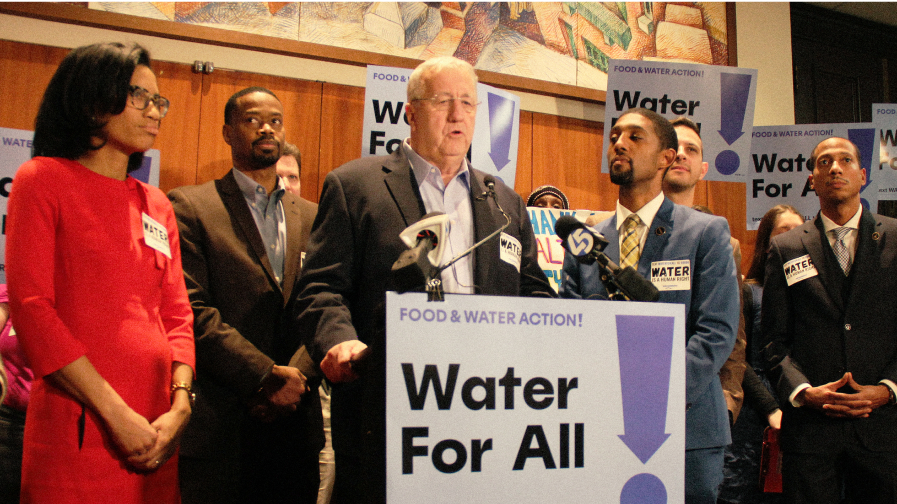
We reached out to leaders in the community and community organizations, and helped form the Baltimore Right to Water Coalition to fight for water justice. The coalition includes dozens of organizations, including Jews United for Justice, Public Justice Center, University of Baltimore-Community Development Clinic, Maryland Volunteer Lawyers Service, Pro Bono Resource Center, and Homeless Persons Representation Project, as well as Pastor James and other religious leaders. Senator Washington (then-Delegate) had sponsored legislation to remove water bills from the tax sale process, and knew that our growing coalition could bring the people-power to win.
With Help From Allies, We Were Able To Help Pastor James Save His Church And Help Others
For two years, Pastor James spoke out against the grave injustice of families losing their homes and churches for unaffordable or incorrect water bills. While in the middle of the fight to keep his church, he spoke out and testified to the legislature and in the media about the importance of the human right to water, and the urgent need for legislative change.
His story humanized this complex and sometimes complicated process, and showed Baltimoreans just what the tax sale process does to community members. He was dedicated to the greater good, and we were dedicated to working with him. Through the Baltimore Right to Water Coalition, we helped find legal counsel to represent him and his church while we continued to fight together for legislation to end this practice.
At the 11th hour — just fifteen minutes before the eviction was set to begin — Pastor James won legal reprieve. It was a moment of joy and relief. He would keep his family’s church. But he knew it was not a complete victory until we ensured that families and communities of worship across the city wouldn’t have to face the same battle as he did. Pastor James continued to fight with us to successfully pass state legislation that prevented tax lien sales due to inability to pay water bills and the bill was signed into law by Governor Larry Hogan in 2019.
Thank god for the new legislation that prevents [tax lien sales] and that it will never happen to anyone else. Credit must go to Food & Water Watch. Food & Water Watch is on the move and I’m glad I have them on my side.
Pastor James
The campaign succeeded because of a number of factors, but most significant was the strong community partnerships that were formed, and the impacted community members like Pastor James who were willing to share their stories. For Food & Water Watch, it was critical to build trust with local leaders and allies. We showed up and listened to people’s concerns. We participated in their events and actions. We worked hard to build consensus within the coalition and we all worked together towards a common strategy and goal.
Joining Forces To Elevate Voices Of Impacted Community Members Fuels Justice
According to Food & Water Watch Maryland Organizer Rianna Eckel, developing strong partnerships and elevating stories about people who were being directly impacted were critical. “My approach was to cast a wide net to groups that were already organizing and working directly with impacted community members,” said Rianna. “We have really strong partnerships with legal aid organizations who are able to bring in experiences and stories of people who are impacted by water injustices in our city. Everyone in the city knew that water affordability was a real problem. We had the capacity to build the Baltimore Right to Water Coalition, bringing together the advocates to come up with solutions, and building the power to get them passed .”
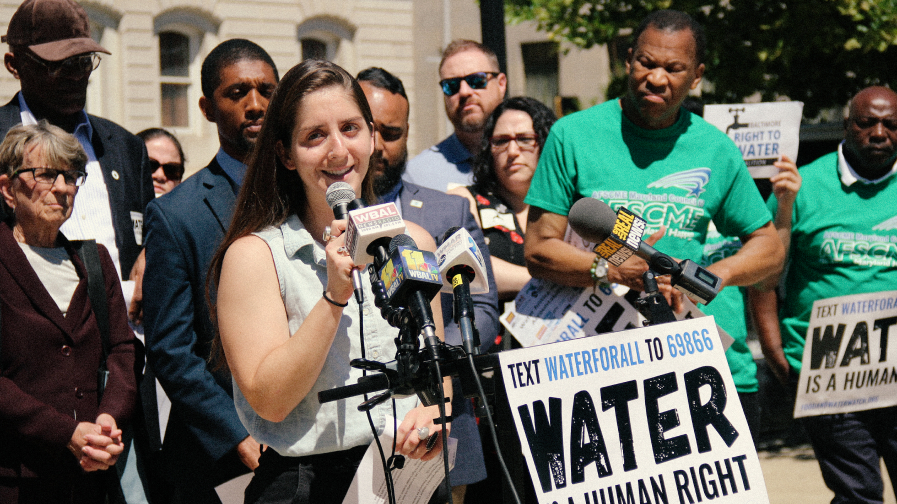
In passing the legislation to stop tax lien sales over unaffordable or incorrect water bills, we all celebrated the significant victory, but the fight for water justice was far from over. While the campaign helped thousands of Baltimore residents, it also shifted the political dynamic around the issue, and brought water justice front and center. During the time of the state legislative effort, we successfully passed a local measure that prohibited water privatization in Baltimore and in late 2019, we passed the Water Accountability and Equity Act through City Council to ensure that water is affordable and accessible to all Baltimoreans. None of this would have been possible without strong and enduring partnerships with grassroots allies that continue today and with whom we continue to fight for water justice.
Learn more about the Baltimore Right to Water Coalition by following the coalition on Facebook.
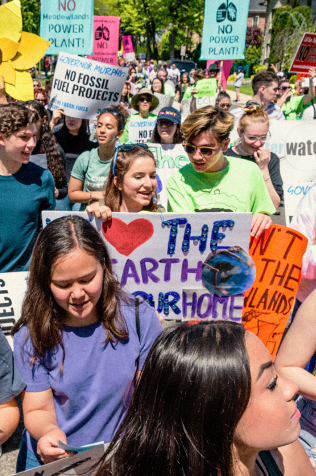
Kearny, NJ: Coalition Was The Key To Fighting Pollution
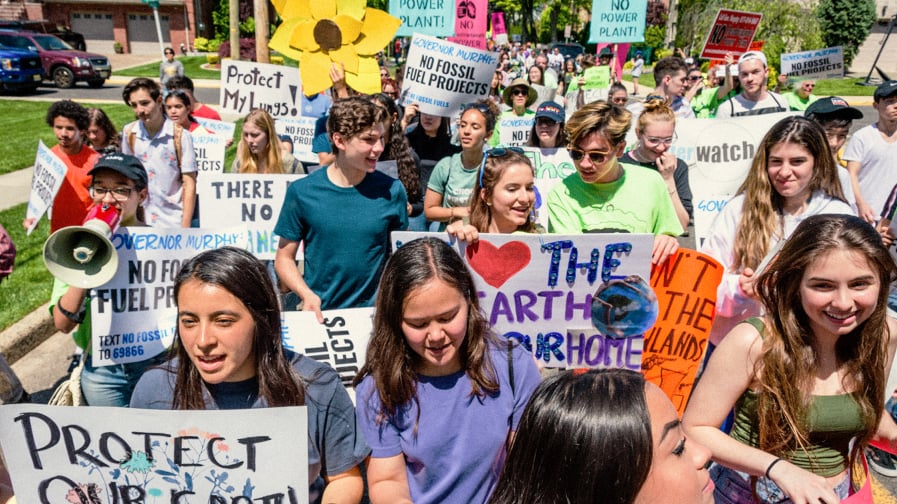
Fracked gas power plants pose a significant threat to our global climate, but they also produce emissions that threaten local environments and public health. That would have been the case in Kearny, New Jersey, if Food & Water Watch and our grassroots partners had not mounted an aggressive and coordinated campaign to pressure Governor Phil Murphy to put the brakes on what would have been a grave environmental injustice.
Kearny, New Jersey is a small, working-class, largely Latinx community on the Hackensack River. As the home of a superfund site at the location of a former oil reprocessing facility, the area is overburdened with environmental pollution. It’s also surrounded by some of the state’s largest cities that are heavy sources of pollution, the New Jersey Turnpike and Parkway, the Port of Newark with thousands of diesel truck trips occurring daily, and a trash incinerator in Newark just across the Kearny border.
We Engaged Organizations Locally When We Heard About A Proposed Gas Power Plant
When we heard of plans by New Jersey Transit to place a 140 megawatt gas power plant in the community, we knew the environmental and health impacts on this overburdened community would only increase. We had just celebrated a significant win with a robust coalition in defeating a proposed power plant ten miles up the river, so we decided to engage in this fight too.
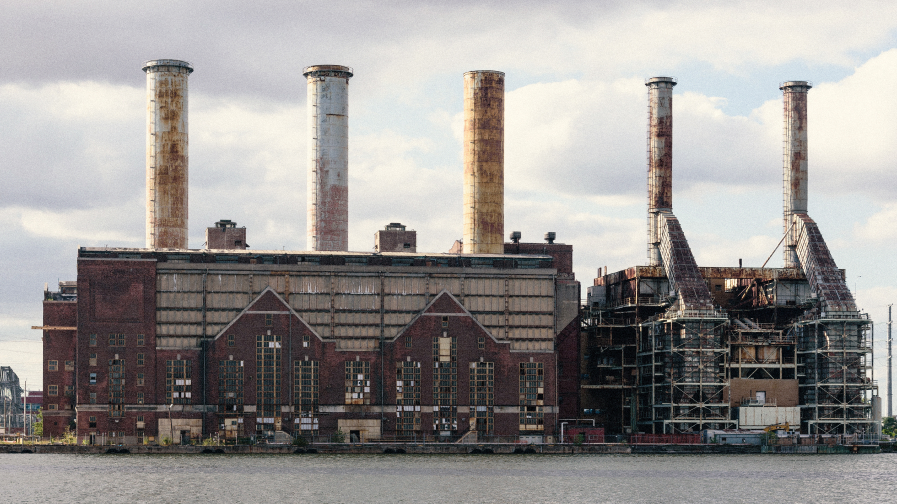
Our first step was to reach out to the local impacted community. We knew many of the leading environmental justice organizations from our previous work on power plants and fighting water privatization. Many were overstretched with existing work and were glad to have our expertise and participation. We formed a coalition that included leading environmental and social justice groups including Ironbound Community Corporation, La Casa de Don Pedro and Newark Water Coalition, a local environmental justice group that was working largely on issues around lead pipes but saw the connection between these issues.
Becoming a part of this coalition allowed me to take the hyper-local fight we were involved in and apply it to the statewide level…I’m really, really thankful for that.
According to Anthony Diaz, Co-Founder of the Newark Water Coalition, “Transit headquarters is in Newark and we’re constantly being impacted by a sludge facility, an oil plant, and incinerators…We have to draw the line somewhere. Becoming a part of this coalition allowed me to take the hyper-local fight we were involved in and apply it to the statewide level and even the global level and I’m really really thankful for that.”
Food & Water Watch Finds Ways To Be Of Service To Those We Partner With
Food & Water Watch contributed organizers, research capacity, online tools, and the strategic experience we gained from previous campaigns. Our community partners provided leadership with on-the-ground knowledge of the community and executing key campaign tactics. Together, we built a formidable coalition with more than 60 organizations opposed to the power plant and successfully passed 16 municipal resolutions opposing it including major impacted communities of Newark, Kearny, Jersey City, and Hoboken. We also went door-to-door in the nearby community, informing residents of what was being planned and engaging them to take action.
Significantly, the campaign was diverse in nearly every way. Of particular importance was the intergenerational aspect of the effort. There was an incredibly strong contingent of young leaders who worked alongside seniors and colleagues of all ages. All the work resulted in a decision by New Jersey Transit to stop the gas power plant and instead invest in what will be the largest renewable energy microgrid in the world.
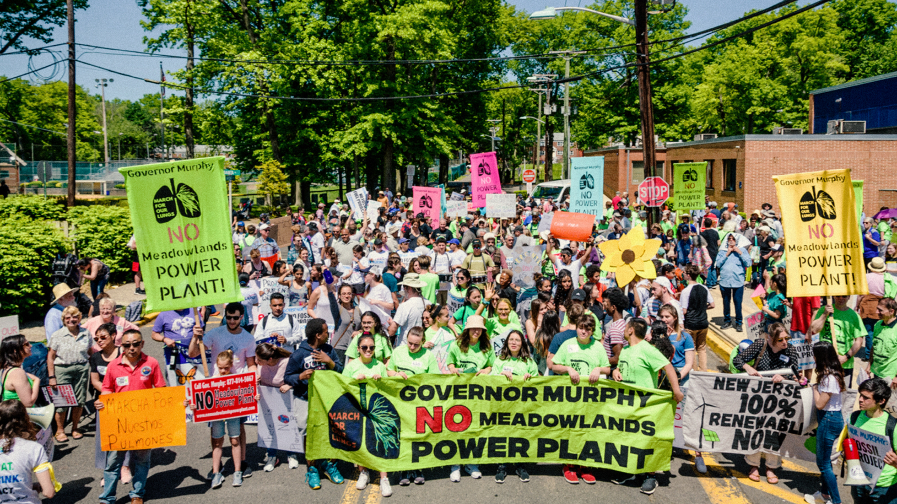
“Working with Food & Water Watch undoubtedly you will get shit done. I’ve seen from the sign- on letters to the direct actions to the door-knocking,” said Anthony Diaz. “There are few organizations that I’m out with heavily and I admire, and it’s a very, very short list I assure you…And I would say FWW is one of those few folks that I do trust.”
Our Partnerships Grow As We Fight The Next Gas Power Plant Together
In the ever-evolving world of politics and government, almost all our victories are incomplete or temporary. While we defeated the gas power plant, we still need to see the renewable energy plans completed. And months following our victory, we learned about plans for another gas plant just two miles away. But we’re in an even better position to defeat that one due to the victory in Kearny, and the organizations we partnered with in the fight are also stronger and many of them are with us again in this next campaign. We are all in a better position to build on our wins to deliver even bigger and more significant change in the years to come.
Learn more about the Newark Water Coalition and how to support their efforts by visiting their website.
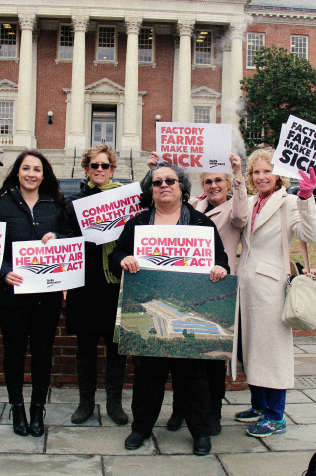
Delmarva Peninsula: Fighting Injustice In Our Food System
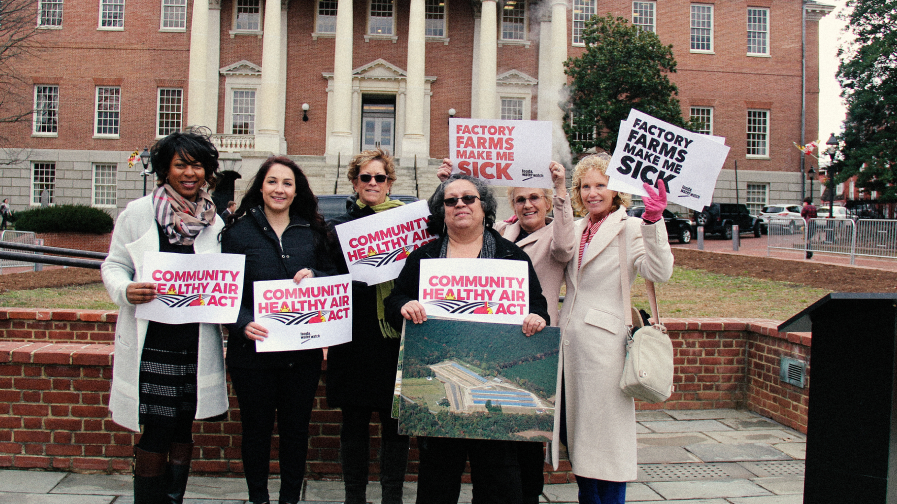
The food system in the United States is industrialized, consolidated, and rooted in inequality and racism. Stemming from a system based on stolen land, stolen labor, and stolen resources, our food system perpetuates injustice. This is most apparent on factory farms, with farmers often locked into abusive contracts, local environments overrun with pollution, and low wealth communities and communities of color bearing the burden.
Chicken Factory Farms On The Eastern Shore Poison Air and Water
Since our start, Food & Water Watch has worked at the national level to fight an unjust food system and for the bold changes needed for sustainability and justice. An area of focus for us for nearly a decade has been the industrial poultry operations on the Delmarva Peninsula – on the Eastern Shore of Maryland and Delaware where massive factory chicken farms poison the air and water.
The factory farm gas is essentially methane — a greenhouse gas 86 times more potent than carbon dioxide over a 20 year period. Leaks through the production and transportation process will help accelerate climate change.
The factory farm industry is massive in relation to the population and size of Maryland’s Eastern Shore. The millions of “broilers” – chickens raised for eating – produce hundreds of millions of pounds of excrement resulting in air and water pollution and related public health impacts. In 2017, factory farmed broilers were responsible for 560 million pounds of waste and in places like Somerset County —which is 43 percent African American and has the lowest average household income of any county in Maryland — factory farm chicken waste is produced at three times the rate of human waste.
Public Health Impacts Are Worst For Vulnerable Communities Near Chicken Factory Farms
The impacts of these factory farms on public health are staggering. Somerset County has some of the worst health outcomes in the state including some of the highest cancer rates.The counties with large numbers of factory farms also have some of the highest rates of lung disease, heart disease, and diabetes in the state. In some parts of the region, up to one in four children suffers from asthma.
The impacts of factory farms fall disproportionately on poor and Black communities due to how and where these facilities are placed. In Wicomico county, for example, the industry tried to site what would have been the largest chicken operation ever — a ten-house complex holding 483,000 chickens — in a community that is 80% African American. Food & Water Watch has partnered for years with the Maryland State Conference of the NAACP, Wicomico County NAACP and other local groups to fight proposals like this and pass state legislation requiring the state to monitor air pollution from chicken factory farms, assess health risks to people living nearby, and require transparent recommendations to lawmakers to improve air quality.
We Joined Forces With The Community To Combat A Major Polluter And Won
In addition, communities are also impacted by the processing plants and biogas facilities that take on the waste from both the growing and processing of poultry. In Delaware, we worked with Gina Burton, the granddaughter of a sharecropper who lost her son due to environmental pollution caused by mega poultry processor Mountaire. Mountaire moved into Millsboro, Delaware promising to bring good jobs and be good neighbors. Instead, they brought polluted air and dirty drinking water. A significant number of wells in nearby communities had such high levels of nitrates that citizens were at risk of serious health problems, including “blue baby syndrome,” some forms of cancer and autoimmune disease.
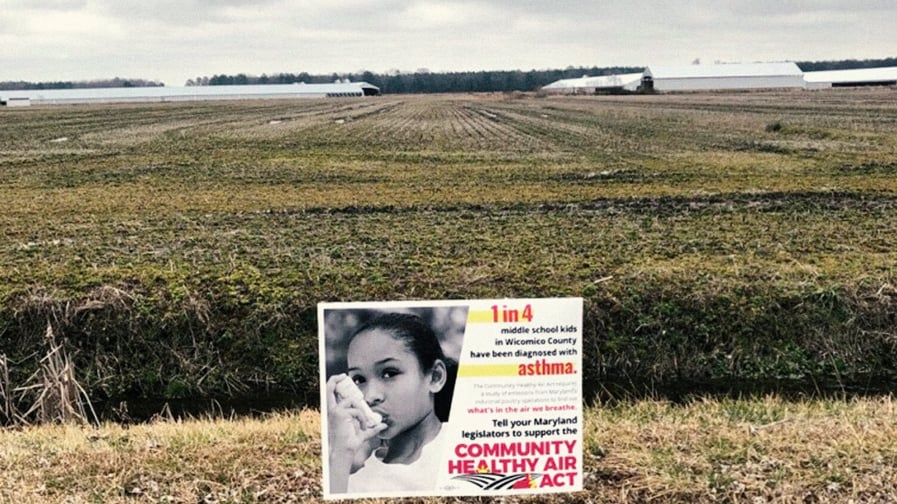
With the help of organizations like the Socially Responsible Agriculture Project, Gina and her neighbors started to mobilize their community and reached out to Public Justice and Food & Water Watch for legal, organizing, and media support. Food & Water Watch worked with Public Justice to put Mountaire on notice that we would sue them under federal law if they didn’t clean up their act. We also helped the community to reach media outlets, and we set up meetings for them to pressure some of the most powerful decision-makers in Delaware, including Senator Tom Carper.
Due to this pressure, the Delaware Department of Natural Resources and Environmental Control entered into an agreement with Mountaire including much of what Millsboro citizens were seeking in their lawsuit. Mountaire must now provide clean drinking water to the community, build a state-of-the-art treatment plant to deal with the plant’s waste and to ensure third-party monitoring of groundwater and spray fields to ensure proper compliance with the law.
This victory proves that when communities come together they can take on moneyed interests and win. One of our strongest partners who is on the front lines in Delaware is Maria Payan, Southern Region Coordinator with the Socially Responsible Agriculture Project and co-chair of Sussex County Health and Environmental Network. Maria works closely with communities fighting factory farms and we have worked together for over a decade. She was instrumental in the Mountaire fight, and she’s also one of the leaders in the fight against the latest destructive industry proposal – a massive factory farm gas facility in her county.
Defeating Pollution Multipliers Like Biogas Schemes Are A Big Focus In Our Partnerships
The factory farm gas proposal, from the firm Bioenergy, would build a large anaerobic digester to generate methane from over 200,000 tons of waste from factory farmed chicken growing and processing –the manure and also the blood, guts, and feathers left over from slaughtering. The project is slated to be placed in a community that has twice the number of people of color and is twice as poor as the rest of the surrounding Sussex County and residents will be forced to bear the brunt of the inevitable air and water pollution from the plant and the constant truck traffic that goes along with it.
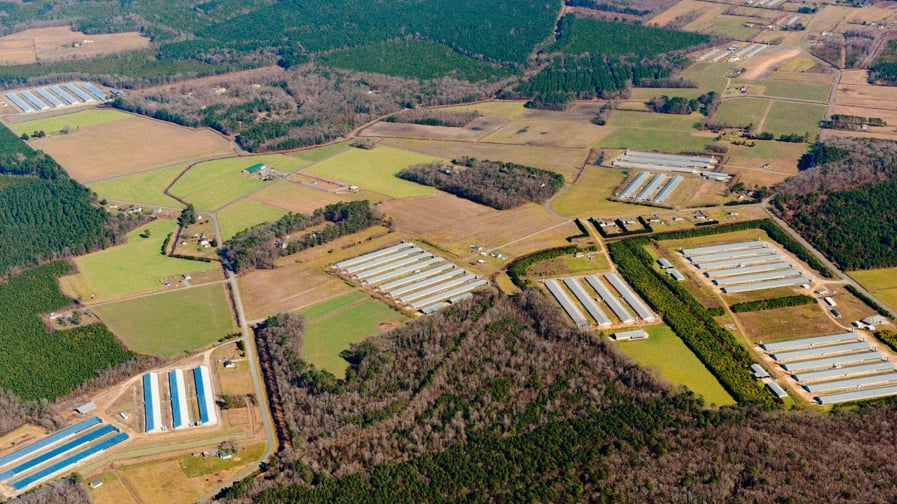
This project will also drive even more expansion of factory farms, as Bioenergy has already contracted with mega grower Perdue for their waste. Further, the factory farm gas is essentially methane – a greenhouse gas 86 times more potent than carbon dioxide over a 20 years period. Leaks through the production and transportation process will help accelerate climate change.
Strong Partnerships Are How We Win Against Factory Farms And Biogas Schemes
Defeating the Bioenergy project – like our efforts to rein in factory farms on Maryland’s eastern shore and the fight against Mountaire – is an uphill battle. Industry has massive amounts of money and political connections. But we know from our previous success banning arsenic in chicken feed in Maryland several years back and our recent success in Delaware battling Mountaire that we can win when we are able to build strong partnerships with regional, state, and grassroots allies on the ground.
We have spent years developing strong relationships in Delaware and Maryland with grassroots partners based on mutual trust and support. According to Maria Payan, the partnerships work because of our approach. “When Food & Water Water Watch is a partner, they are there to support the local fights in the communities and advance something, but those local groups have a seat at the table and that’s so important. Food & Water Watch doesn’t come, take something on and go on their own and do it…It is the community fighting their fight with the assistance of Food & Watch.”
As we move forward to ensure that Mountaire complies with its settlement agreement and to fight the factory farm gas plant in Seaford we are continuing that approach, reaching out to local leaders for advice and partnership. We have an organizer on the ground in Delaware working with residents and local leaders to re-energize and build upon the powerful coalition and campaign started against Mountaire to stop the factory farm gas facility from ever being built.
It will take a tremendous effort from a broad cross-section of organizations at the federal, state, and local level to bring justice to our food system. Food & Water Watch is committed to working with community partners across Maryland, Delaware, and the rest of the country for the long haul to make this transformation happen.
Learn more about the Sussex County Health and Environmental Network and how to support their efforts by visiting their website.

Ventura County, CA: Coalition Work Wins The Day
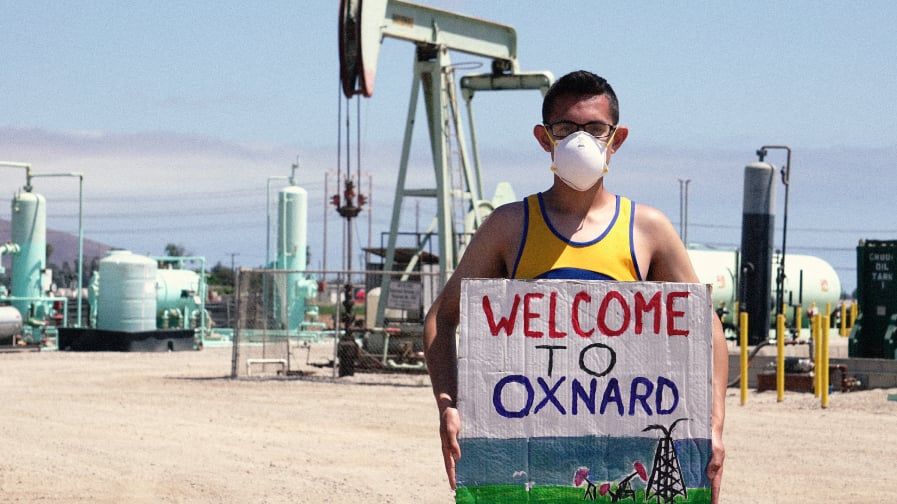
Just off the California coast between Malibu and Santa Barbara, Oxnard is an often overlooked community of 200,000 largely working-class people. The city — seventy-five percent Latinx — is the largest in Ventura County and spans from the coast inland, bordering a big agricultural region where strawberries are grown, among other crops. Oxnard’s piece of the iconic California coast is dotted by fossil fuel power plants and its residents have suffered environmental injustices at the hands of the fossil fuel industry.
How We Got Started In Oxnard
Food & Water Watch had engaged in a limited way in Ventura County early on in our campaign to ban fracking in California. But in 2014, we placed a full-time organizer there because the county is a large oil and gas producing region; helping curb the fossil fuel industry there would have significant impacts across the state.
We planned on working to stop fracking and drilling, but we quickly learned that the more immediate fight in the community centered on a proposed fracked gas power plant that would further harm residents. Many parts of Oxnard already have asthma rates above the 90th percentile in California, and Oxnard has more power plants along its coast than any other city in California. Members of the community and grassroots organizations told us that this was a major priority. We clearly saw the connection between fracked gas infrastructure and the need to stop drilling altogether.
Joining Forces With CAUSE And Other Allies In Ventura County
Food & Water Watch leapt into action, partnering with Central Coast United Alliance for a Sustainable Economy (CAUSE), the lead grassroots group organizing the fight against the power plant. We helped petition, make calls, organize rallies, conducted trainings and hired interns for the campaign. We engaged people by going door to door and talking with people about the power plant, its impacts, and what people could do about it. With CAUSE, we built a coalition around defeating the power plant with dozens of groups. Our coalition met monthly to plot strategy and develop tactics. We merged our campaign expertise from running dozens of campaigns across the country with the local knowledge and experience of our partners.
Food & Water Watch has led so many campaigns that have put Ventura County on the map about pushing back against oil and gas.
According to Tomás Rebecchi, Central Coast Organizing Manager at Food & Water Watch, a key to building these strong partnerships was being intentional and putting in time to develop relationships. “You can’t just drop in and say this is what we’re doing. Food & Water Watch had our back and gave us space and time to build those relationships. Building trust and relationships take time but by showing up, lending support, and listening, we were able to build a powerful campaign and coalition which has changed the face of Ventura County.”
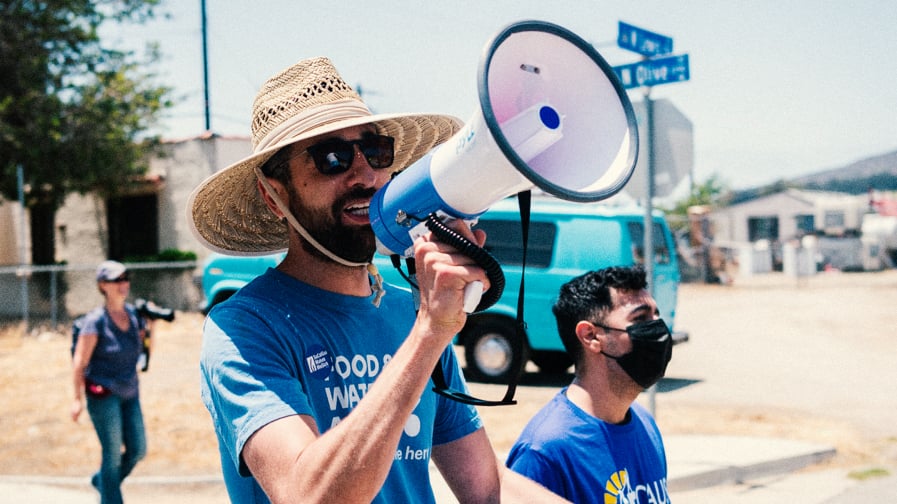
The campaign also prioritized justice and impacted residents. We worked hard to give all members of the community the tools they needed to speak out at City Council meetings, including language access through translation which was not previously provided. We had to fight for that, but in the end, some decision-makers said those comments helped impact their decision the most.
Showing Each Other Winning Is Possible Through People Power
All of this resulted in a historic victory for the people of Oxnard against the fossil fuel industry. After four years, we defeated the proposed power plant. More significantly, we shifted the balance of power in a county that had been dominated by oil and gas interests for years. Prior to the power plant campaign, fracking and drilling permits were rubber-stamped and environmental and health concerns were always set to the side. But this campaign showed people what’s possible through organizing.
“Food & Water Watch has led so many campaigns that have put Ventura County on the map about pushing back against oil and gas. There is so much work to do but our organizations are… working together to transform what our communities look like and transforming them to serve our frontline communities,” said Lucia Marquez, Senior Policy Advocate with CAUSE. “That’s what keeps me in this work – the partnerships and the folks that we work with together — we’re really making these changes and bringing in the most impacted communities to be part of the fight, and Food & Water Watch is very intentional about that.”
The power plant campaign spun off other related efforts. We worked – also in partnership with CAUSE and other community allies – to block dozens of new proposed oil wells and win a setback — the strongest in the state — to prevent oil drilling near homes and schools.
None of this would have happened without strong partnerships with local community allies. Learning from local leaders, honoring their local knowledge, and respectfully partnering with them to advance their priorities was critical. Our work in Oxnard and Ventura County is far from done, but we are now stronger than ever and our collective power is apparent.
The Work Continues In Ventura County To Beat Fossil Fuel Infrastructure
SoCalGas recently announced plans to double the size of a toxic gas compressor across the street from an elementary school in a disadvantaged community, but we were ready with our coalition of allies to fight back and protect our communities. Defeating that project is the next step in our efforts going forward as we work towards a more just, healthy and environmentally sustainable Ventura County.
Learn more about CAUSE and how to support their efforts in Ventura by visiting their website.
Water Justice In Baltimore
In Baltimore, we’ve worked for more than a decade on issues related to water access and privatization. When Pastor Mark James was threatened with foreclosure on his community’s church, Food & Water Watch partnered with him and other local and state allies in the Baltimore Right to Water Coalition to pass legislation that would prevent foreclosures and tax sales for failure to pay water bills. For a city with significant poverty where thousands of people are burdened by unaffordable bills, this was a major victory. Pastor James’ Barnes Memorial Church faced imminent foreclosure, but Food & Water Watch assisted him in finding legal counsel, and together we worked to get the law changed. It was a successful and fruitful partnership that resolved the foreclosure action, but also led to statewide legislation impacting thousands of people. According to Pastor James, “the work that Food & Water Watch does really is a model to be studied…It’s a trend setter to watch how they operate and how they communicate and how they with little means can be so effective.”
The Fight Against Fracked Gas Plants In Oxnard, California
In Ventura County, California, Food & Water Watch has successfully partnered with local allies to stop a polluting fracked gas power plant in the largely Latinx and environmentally over-burdened community of Oxnard. Our partnership with Central Coast Alliance United for a Sustainable Economy (CAUSE), which began in 2015, resulted in not only the defeat of the power plant, but subsequent wins blocking proposed oil drilling and water privatization. As Lucia Marquez, Senior Policy Advocate with CAUSE said, “Working with Food & Water Watch is like working with community. There are two forms of power out there. There’s the power of money and there’s the power of community — the power of organizing…Food & Water watch brings…their state relationships with reporters and organizations and lawyers and resources… [they are] such a vital partner of ours and we’re so happy to be working on these campaigns together throughout the years and throughout our communities, because when we’ve worked together, we’ve had very real success…”
New Jersey Coalition Work Has Been Crucial In Stopping Fracked Gas
In New Jersey, we have worked to build strong coalitions to fight against power plants near Newark and Jersey City. Working closely with the Newark Water Coalition and others from 2019-2020 when we defeated the proposed New Jersey Transit fracked gas power plant in a largely Latinx community in Kearny, New Jersey, that was impacted by several other sources of industrial pollution. Not only was the campaign successful, but the Newark Water Coalition was stronger as a result of the campaign. According to Anthony Diaz, co-founder of the Newark Water Coalition, “the coalition fight against this power plant legitimized Newark Water Coalition on the statewide level, allowed us to have so many connections, and join a world that historically as an activist and organizer I was never part of.”
Factory Farm Fights In Maryland and Delaware
On the Delmarva Peninsula, which includes the Eastern Shore of Maryland and part of Delaware, communities are overburdened by the impacts of factory farms – the waste from over 300 million chickens that in some places is so bad that one in four children have asthma as a result. Food & Water Watch is partnering with groups to stop a massive factory farm gas facility in Delaware that would drive further expansion of factory farms and have significant local impacts in a lower income largely Latinx community that is already burdened by a superfund site. Maria Payan, co-founder of Sussex Health and Environmental Network is glad to have Food & Water Watch in the fight because “when Food & Water Watch is a partner, they are there to support the local fights in communities. Food & Water Watch doesn’t come, take something, and go on their own and do it.”
Building strong community partnerships to advance environmental justice doesn’t happen by accident. It flows from our organizational values, intentional interaction with partners, listening, supporting, and showing up. Working to build the power needed to win campaigns against powerful adversaries isn’t easy, but we know that to win at the local, state, or national level, we need to center justice, work to strengthen local organizations, and build powerful diverse coalitions.
Local, Grassroots Work Is Integral To State And National Campaigns
These partnerships lead to winning campaigns, but they have also helped advance state and national efforts. Championing water access in Baltimore was critical to advancing state legislation and supports the call for national water legislation, which we are pursuing through the WATER Act. Fighting power plants in Ventura and New Jersey supports broader statewide efforts to get two key Democratic Governors to stop all new fossil fuel infrastructure and the national campaign to ban fracking everywhere. Working to stop a major factory farm gas facility in Delaware and factory farms on the Eastern Shore of Maryland help elevate the need to ban factory farms at the national level through the Farm System Reform Act and for President Biden to reject factory farm gas as part of our national energy program – especially important as his home state is Delaware.
Ultimately, Food & Water Watch wants to help drive systemic changes that will lead to economic, environmental, and racial justice. That means building power so that we can hold elected officials accountable for the decisions they make and push them to advance the bold change we need.
To win real improvements in people’s lives and build the kind of society we want, we must engage in districts where there are key members of Congress and places that will be important to move our elected officials. We’re not a large organization. That means we have to be strategic about where we engage to make the most progress in stopping destructive measures and passing the legislation that will create the country we want.
At a time of great racial and economic inequality, we reaffirm our values and continue to strive to improve how Food & Water Watch works alongside and in support of our allies. One thing we are certain of is this: to win long term and meaningful solutions to our food, water, and climate challenges, we must continue to support communities that have borne the brunt of environmental pollution and continue to build meaningful and lasting partnerships, so we can be more powerful together and win the fundamental changes that are so badly needed.
Everybody needs safe water. Support the WATER Act!
Enjoyed this article?
Sign up for updates.
TO TOP


